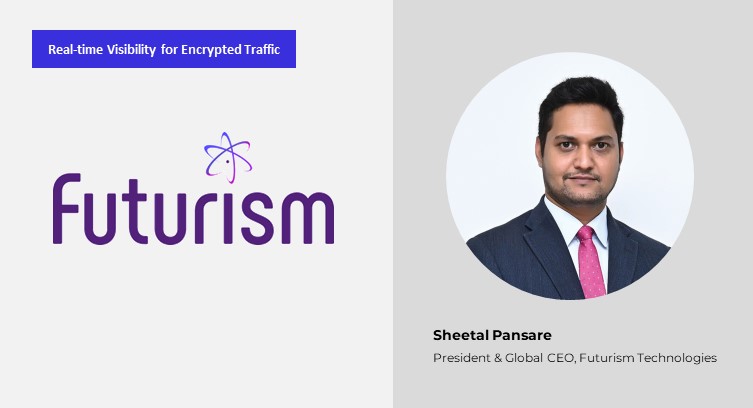The Fast Mode spoke to Sheetal Pansare, the President & Global CEO at Futurism Technologies on new encryption technologies and their impact on today's networks. Sheetal joins us in a series of discussions with leading vendors in the traffic management, service assurance, traffic monitoring, analytics, policy control and network security space, assessing various attributes of encryption, its benefits as well as the challenges it poses, specifically loss of visibility that makes networking increasingly complex.
Tara: What is the importance of encryption and what are some of its benefits?
Sheetal: With more and more organizations moving to multi-cloud and hybrid cloud environments at breakneck speed, the need for robust data security and encryption was never this evident.
Yes! Protecting enterprise data across complex environments is a growing concern for many companies and enterprise app developers across the world. This is why data encryption is the need of the hour.
Importance of encryption
In many organizations, instant messaging apps are a go-to tool to communicate with peers, consumers and partners. Making it worse, most employees tend to use vulnerable and risky apps to share and transfer critical business information. Thus, app developers ought to pay heed to end-to-end data encryption to protect sensitive business information while allowing employees/users to perform their job functions in a seamless and safe manner.
Benefits of encryption:
1. Protects data across all devices and endpoints
Transferring data from one device or database to other is a risky affair. A strong endpoint encryption solution can manage threats for all your mission-critical endpoints and devices including desktops, mobile phones, wearables, connected IoT devices, apps, email, digital front doors, and more. Such a security measure will not only help to deter unauthorized users, but will also deliver better visibility and control over your data and devices. Importantly, it not only encrypts data, but also offers powerful encryption key management, audit and access control capabilities.
2. Ensures compliance
Depending on the industry, data encryption may become a mandatory measure than optional. For instance, healthcare sector calls for strict compliance requirements such as HIPAA to protect sensitive patient information. Since encryption is an explicit requirement in such cases, having a strong encryption mechanism in place can help healthcare organizations comply with stringent regulations and keep hefty fines at bay.
3. Safeguards data integrity
Data encryption ensures that only authorized entities/personnel or parties get access to sensitive company information. It helps increase the integrity of data. Most importantly, it decreases the likelihood of a cybercriminal successfully tampering with the data and that attack goes unnoticed.
There are plenty of reasons to get your head into data encryption considering the inflating attack surface and attack tactics used by new-age cybercriminals in today’s digital-first economy.
Don’t wait for the bait! Get help now!
Tara: How does encryption impact network security?
Sheetal: Did you know - only 54% of organizations feel confident about their network security! (Source: Security Magazine)
Your data is at risk when stored, in motion and/or when shared within networks.
Network encryption is a security practice applied to an enterprise’s network to protect, manage and control data within networks. It involves encrypting the data as it moves from one node and decrypting the same when it arrives at another node. Network encryption provides protection against malicious network activities such as man-in-the-middle and snooping attacks. When done right, it offers a strong foundation for network security strengthening a company’s overall security posture.
Impact of encryption on network security
1. Trusted networks
Network encryption is a preferred security practice preferred by prominent industries and sectors including telcos, financial institutions, healthcare providers and other commercial organizations across the world. Network encryption is a fundamental building block towards a powerful data security approach.
2. Improved network performance
A strong network encryption and threat detection solution delivers maximum uptime in some of the most complex, demanding and performance-intensive IT/network environments. Such a solution tends to have near-zero latency and can work in optimum mode thus, improving network performance. It scans your network for anomalous communications and activities.
3. Comprehensive network security
Many forward-thinking organizations go a step ahead and secure not only their Internet traffic, but also protect their internal corporate networks and virtual private networks or VPNs with robust network level encryption.
Takeaway
Organizations that adopt a comprehensive encryption framework suffer from fewer data breaches and data loses. As attackers are getting smart with each passing day coming up with sophisticated attack tactics, it is imperative for businesses to stay ahead of network threats with advanced network encryption and security practice.
Data network eavesdropping, human error or technical breakdowns, data theft and data tampering, have all become commonplace these days. Implications of a breach are often brutal and catastrophic for a company and encryption ensures that a company’s data remains safe while being transferred or moved across data networks.
This interview is a part of The Fast Mode's Real-time Visibility for Encrypted Traffic segment, featuring 34 leading IP networking solution providers and their views on the impact of encryption on traffic visibility. A research report on this topic will be published in February 2023 - for more information, visit here.




















